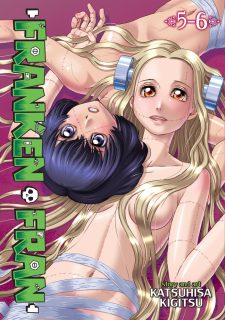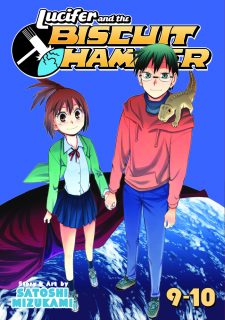My News and Reviews
Last week at Experiments in Manga the winner of the Please Tell! Me Galko-chan manga giveaway was announced. The post also includes a fairly comprehensive list of the full-color manga and manhwa that have been released in print in English. (However, I just now realized that I neglected to include manga like Katsuhiro Otomo’s Akira and Buronson and Tetsuo Hara’s Fist of the North Star which, while not originally illustrated in full-color, had some full-color editions released in English.) Otherwise it was fairly quiet week, but I am well on my way to completing an in-depth review for February. Happily, my goal to write at least one long-form feature every month so far seems achievable.
I wasn’t actually online much at all last week (things were pretty hectic at work and there are always a fair number of taiko and lion dance performances I’m involved in around Chinese New Year) but there were still a few things that caught my attention: Vic James wrote an essay for Tor.com about Yukio Mishima and Forbidden Colors–The One Book That Made Me Move to Japan. (Mishima fascinates me and was actually my introduction to Japanese literature; I’ve reviewed quite a few books by and about him.) The most recent issue of Words without Borders is devoted to international graphic novels. Also, Digital Manga’s Juné imprint announced two new print licenses (Psyche Delico’s Even a Dog Won’t Eat It and Choco Strawberry Vanilla) as well as its upcoming Kickstarter project to publish the first volume of Velvet Toucher’s Eden’s Mercy.
Quick Takes
 Bloom into You, Volume 1 by Nakatani Nio. I’ll have to admit, recently I’ve grown a little weary of high school romances. Even so, I was still very interested in reading Bloom into You, one of Seven Seas most recent yuri series. Specifically, I was curious about the manga’s treatment of aromanticism, something which I haven’t seen many series address. Yuu has never fallen in love and so she is glad to meet Nanami, an upperclassmen who likewise has never felt that way about anyone before. Finally Yuu has someone she feels comfortable confiding in about it except that Nanami is now falling in love with her. One of the things that I really appreciate about Bloom into You is how considerate and respectful Nanami is of Yuu’s feelings (an exception being a stolen kiss). It’s also obvious that they both care about each other, even if Yuu hasn’t yet experienced the romantic spark that Nanami has only recently found for herself. The two of them actually communicate, too, so there’s none of the silly misunderstandings that plague so many other series that would easily be solved if the characters would simply talk to each other. I would definitely like so see how Yuu and Nanami’s relationship continues to develop from here.
Bloom into You, Volume 1 by Nakatani Nio. I’ll have to admit, recently I’ve grown a little weary of high school romances. Even so, I was still very interested in reading Bloom into You, one of Seven Seas most recent yuri series. Specifically, I was curious about the manga’s treatment of aromanticism, something which I haven’t seen many series address. Yuu has never fallen in love and so she is glad to meet Nanami, an upperclassmen who likewise has never felt that way about anyone before. Finally Yuu has someone she feels comfortable confiding in about it except that Nanami is now falling in love with her. One of the things that I really appreciate about Bloom into You is how considerate and respectful Nanami is of Yuu’s feelings (an exception being a stolen kiss). It’s also obvious that they both care about each other, even if Yuu hasn’t yet experienced the romantic spark that Nanami has only recently found for herself. The two of them actually communicate, too, so there’s none of the silly misunderstandings that plague so many other series that would easily be solved if the characters would simply talk to each other. I would definitely like so see how Yuu and Nanami’s relationship continues to develop from here.
 Franken Fran, Omnibus 3-4 (equivalent to Volumes 5-8) by Katsuhisa Kigitsu. Despite what the cover illustrations would seem to imply, Franken Fran isn’t particularly heavy on fanservice. Granted, there is some nudity in the series, but it’s generally more discomfiting than it is titillating. Franken Fran is a manga that delights in making its readers uncomfortable. But although it is frequently gruesome and grotesque, the quirky horror is accompanied by a great deal of humor as well. Kigitsu uses actual medical and scientific phenomenon as inspiration but takes them to such logical and illogical extremes that they become almost unrecognizable. The horror in Franken Fran works as well as it does because there are these little kernels of truth underneath it all. For the most part Franken Fran tends to be episodic although the stories can largely be categorized by recurring types, settings, and characters. For example, there are numerous chapters based in Fran’s school as well as a set of quickly escalating stories about the supposedly superheroic Senitals. More characters are introduced as the series progresses, too, including Fran’s incredibly crass, vulgar, and homicidal older sister Gavril.
Franken Fran, Omnibus 3-4 (equivalent to Volumes 5-8) by Katsuhisa Kigitsu. Despite what the cover illustrations would seem to imply, Franken Fran isn’t particularly heavy on fanservice. Granted, there is some nudity in the series, but it’s generally more discomfiting than it is titillating. Franken Fran is a manga that delights in making its readers uncomfortable. But although it is frequently gruesome and grotesque, the quirky horror is accompanied by a great deal of humor as well. Kigitsu uses actual medical and scientific phenomenon as inspiration but takes them to such logical and illogical extremes that they become almost unrecognizable. The horror in Franken Fran works as well as it does because there are these little kernels of truth underneath it all. For the most part Franken Fran tends to be episodic although the stories can largely be categorized by recurring types, settings, and characters. For example, there are numerous chapters based in Fran’s school as well as a set of quickly escalating stories about the supposedly superheroic Senitals. More characters are introduced as the series progresses, too, including Fran’s incredibly crass, vulgar, and homicidal older sister Gavril.
 Lucifer and the Biscuit Hammer, Omnibus 5 (equivalent to Volumes 9-10) by Satoshi Mizukami. It’s been quite a while since the last omnibus of Lucifer and the Biscuit Hammer was released. I’m not entirely sure why it took me so long to finally get around to reading it though since there was so much about the series that I enjoyed. The ending of the series was pretty great. It was immensely satisfying to see the Beast Knights pull together for the final battle against Animus as a tightly knit team, surpassing everything that they’d previously accomplished. They are a group of troubled outsiders who have established a tremendous and lasting bond with one another despite, or maybe because of, their differences. As weird a manga as Lucifer and the Biscuit Hammer can be–and it can be very weird (which is admittedly something that I like about the series)–it still manages to have a surprisingly deeply resonant core. If it wasn’t already clear, the conclusion of the series’ makes its theme explicit. Underneath the psychic powers and supernatural battles is a story about growing up regardless of how old someone actually is, about survival in the face of the worst that life can throw at somebody, and about forming meaningful connections with others.
Lucifer and the Biscuit Hammer, Omnibus 5 (equivalent to Volumes 9-10) by Satoshi Mizukami. It’s been quite a while since the last omnibus of Lucifer and the Biscuit Hammer was released. I’m not entirely sure why it took me so long to finally get around to reading it though since there was so much about the series that I enjoyed. The ending of the series was pretty great. It was immensely satisfying to see the Beast Knights pull together for the final battle against Animus as a tightly knit team, surpassing everything that they’d previously accomplished. They are a group of troubled outsiders who have established a tremendous and lasting bond with one another despite, or maybe because of, their differences. As weird a manga as Lucifer and the Biscuit Hammer can be–and it can be very weird (which is admittedly something that I like about the series)–it still manages to have a surprisingly deeply resonant core. If it wasn’t already clear, the conclusion of the series’ makes its theme explicit. Underneath the psychic powers and supernatural battles is a story about growing up regardless of how old someone actually is, about survival in the face of the worst that life can throw at somebody, and about forming meaningful connections with others.
